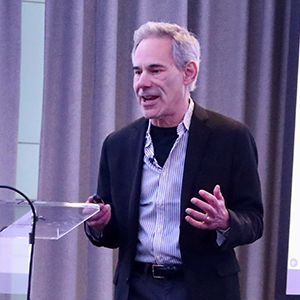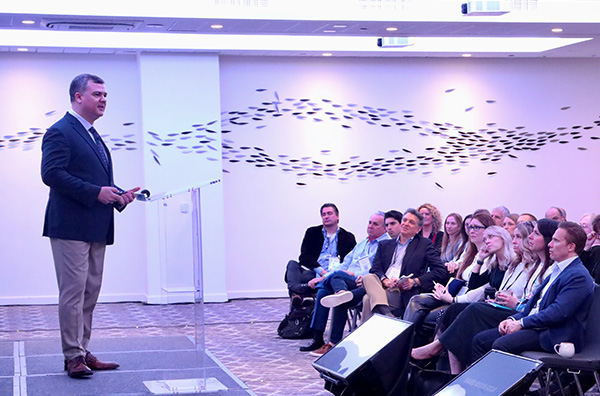
Artificial intelligence will let retailers personalize the customer experience in ways we’re just beginning to imagine, David Edelman (pictured), a senior lecturer in marketing at Harvard Business School, said during a seminar on “Customer Strategy in the Age of AI,” held at the Plumb Club Symposium ’24.
Personalization is “not just sticking your name on a marketing thing,” said Edelman. “It’s actually creating fundamentally new experiences at scale as part of your operating approach.”
Edelman noted that when he was shopping for solar panels, he received a flood of marketing materials in the mail. But one stood out: It featured a Google Earth image of his home with solar panels superimposed on it.
“There were calculations that explain how much energy the panels would generate, information from Zillow to estimate how much energy my house would generate in a year,” he said.
Jewelry companies could adapt this by generating images of how a special piece looks on someone’s body, he said.
“AI will allow you know and reach your customers,” he said. “What are people complaining about? Are there new trends or styles that people are talking about?… [AI will empower] customers to get what they want easier, quicker, and possibly cheaper.”
Attendees of the Symposium, which took place March 10 and 11 in New York City, also heard from Robert “Cujo” Teschner, a retired Air Force fighter pilot and author of Debrief to Win, who said in his presentation that the best leaders take responsibility for their mistakes.
“The easiest strategy for leaders is to avoid accountability,” Teschner said. “Defensiveness is on the rise. When we confront someone, it’s never their fault.”
But true leaders examine their failures for possible lessons, he added.
“You hit real teamwork when people vie to take responsibility for a failure,” he said. “Accountability shouldn’t be weaponized. We need to harness accountability as a way to learn.”

In another Symposium highlight, Melanie Grant, executive director of the Responsible Jewellery Council, said during a session on corporate social responsibility that by 2025, 20% to 30% of global fine jewelry sales will be influenced by sustainability concerns.
“There is a change in consumer expectations,” she said. “They want ethical, authentic, social justice-oriented purchases. They want jewelry to have meaning. They want you to have opinions. They want to see that you’re genuine and you’re not just doing it to sell things.”
Grant acknowledged that adjusting to all the new consumer expectations can feel “overwhelming.”
“You’re not supposed to know it all,” she said. “It is a process of continuous improvement over time.”
But sustainability also requires sustained commitment: “It has to go beyond compliance and become a mindset.”
At another seminar, Aliza Licht, a marketer famed for her “DKNY PR Girl” Twitter feed, told attendees that to make a brand relevant for today’s consumer, companies have to make sure it has a distinct brand identity.
Licht, author of On Brand and Leave Your Mark, recommended companies perform a “brand audit,” to better understand how people perceive it.
“What are three adjectives that describe your brand?” she asked. “If you polled your employees, would they use the same three words? Would your customers?”
The Plumb Club Symposium ’24 attracted 225 industry executives. It was presented in partnership with JCK, with Jewelers Mutual as founding sponsor.
Victoria Gomelsky contributed to this article.
(Photos courtesy of the Plumb Club)
- Subscribe to the JCK News Daily
- Subscribe to the JCK Special Report
- Follow JCK on Instagram: @jckmagazine
- Follow JCK on X: @jckmagazine
- Follow JCK on Facebook: @jckmagazine






